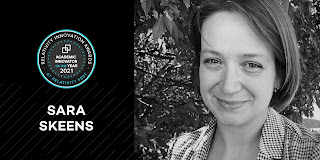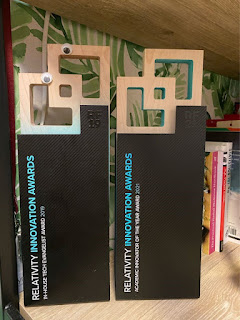Sara Skeens Named Academic Innovator of the Year
Every year at their annual conference Relativity holds an award ceremony for several categories. The Academic Innovator of the Year award recognizes an educator that uses the Relativity Academic program in their classroom and teaches the subject of legal technology in new and innovative ways.
One of the innovative aspects I add to my class that I think is incredibly important especially in a virtual environment is finding ways to make technical concepts hands on. Technical concepts can be broken down into physical activities, similar to what happens within the tech itself. Essentially removing the black box. For instance, to demonstrate data variety I use shapes to represent different data types. They are placed in piles (different data sources) and then we have our processing software which is a cube with only a few shapes cut into it. After the shapes go into that box they all come out as the same shape to show how we normalize the data to load into our review software which is another box with a single shape cut out. This shows that we have to either 1. Normalize our data to work in processing and review OR 2. Adapt our software to be able to accept new shape (I do this by cutting new shaped into the box).
This is something that students can easily understand by watching or can create their own shapes out of clay or paper and walk them selves through the process. This provides not only a reading and and verbal explanation, but also a visual and hands on. I make sure all technical concepts are broken down this way to the bare minimum to help students really relate to and understand the inner workings. Rather than just saying we collect or process the data, I break down the internal gears and steps that happen inside the black box.
Additionally, having a consistent real world example gives students the ability to follow along the entire process. I provide sample case stories based on real life that we can follow throughout the class so students can relate each step back to that case and follow along throughout the semester in real time. I have created sample documents, pleadings, conference calls etc. around that story and I am currently expanding the data set so we can load it to Relativity and have a full case experience.
It is important to provide career guidance and opportunities. As well as skills around mindset and critical thinking that can be used in the classroom and outside as they pursue a career in what they are learning. I run a module just on careers based in eDiscovery. I bring in folks with lots of different backgrounds to talk about how they got into the field and navigated their career. First giving them a networking opportunity and a chance to see how different experiences can be and to have multiple perspectives. Throughout the semester I look at their resumes and send job opportunities and take the time to work through how to write their resume to their careers goals and help them through interviewing and networking. I have been able to place multiple students in eDiscovery positions each semester through this career module and by providing support through out the semester. I have found that focusing on some of those skills such as mindset and critical thinking has help students to have more confidence and a positive attitude towards the challenge of career searching. I work with recruiters to have a channel of opportunities for entry level jobs.
Additionally, I have founded the Legal Technology Educators Community, a group of legal educators coming together to share ideas, collaborate on working projects to create sample data, resources and educative materials to share. Moreover, I am creating educational videos on YouTube and I have an educational podcasts where I speak with experts in the field.

